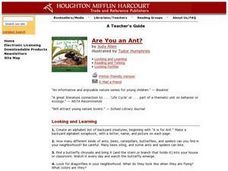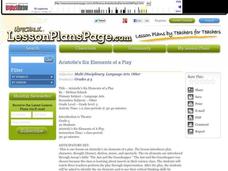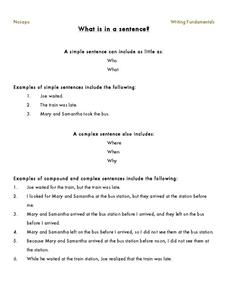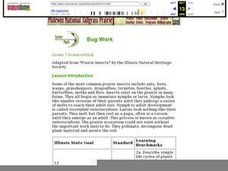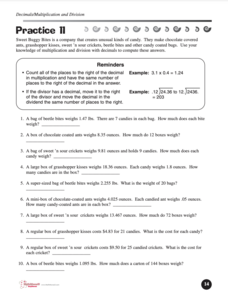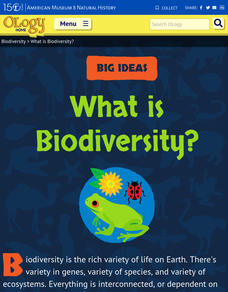Curated OER
Are You an Ant?
Students investigate different insects in their backyard. In this insect lesson, students read the book Are You and Ant? and apply the reading to their backyards. Students create a list of animals that begin with the the letter A an make...
Curated OER
The Ant and the Grasshopper
In this cause and effect practice worksheet, learners read a brief written piece about an ant and a grasshopper. Students then write a cause and effect on each map.
Curated OER
Aristotle's Six Elements Of A Play
Fifth graders view the play, The Ant and the Grasshopper. They define Aristotle's six elements of a play. At the end of the instructional activity, 5th graders be asked to participate in the play by acting like busy ants. This...
Overcoming Obstacles
Being Responsible
Responsible-decision making is the focus of the social-emotional learning lessons. After reading, The Ant and the Grasshopper: An Aesop Fable, scholars come up with six steps to take responsibility for their actions and then practice the...
Cornell University
Insect IPM
Find out the characteristics that makes a bug an insect with a workbook designed to inform scholars about the crawly creatures that live around us. Scholars complete an ant-themed word search, answer questions using a solution key, and...
Curated OER
Insects
Students read books, learn about the letter i, and eat raisins that represent ants all to learn about insects. In this insects lesson plan, students also observe an ant farm and play follow the leader.
Curated OER
Bugs Worksheet - What Bugs Do
In this bug themed worksheet, students will examine seven bugs and seven descriptions and then determine which bug matches each description.
Curated OER
Story Elements that Support the Theme
Three great graphic organizers guide readers to see how the elements of plot and main idea can be charted to reveal the theme of a story. Model the process on the provided Direct Teaching Teacher Graphic Organizer using Aesop’s The...
Nosapo
What Is in a Sentence, Paragraph, and Story?
Language arts is made up of many parts. Learners review the parts of a sentence, as well as how to make a simple sentence into a complex sentence, before examining full paragraphs and identifying the topic, body, and concluding sentence...
School Specialty
The Tortoise and the Hare - Drawing Conclusions/Predictions Outcomes
Does the fastest one always win the race? Look deeper into The Tortoise and the Hare with a set of discussion questions for before, during, and after reading the story.
Curated OER
Understanding Theme with Fables
What is the moral of the story? Ask your class to read a series of fables from which the last line has been removed. After supplying this concluding statement, they must justify their responses. This could be used as an individual or...
Curated OER
Bug Work
Students explore the life cycles of insects and how they interact with each other in the prairie to create a healthy ecosystem and viable food chain. They list animals or insects in their own community that are similar to the prairie...
Curated OER
Storytime Quiz 1
In this novels worksheet, students answer short answer questions about famous novels and authors. Students complete 10 short answer questions.
Curated OER
Fables: A Short Anthology
Explore fables with your class. Learners read a series of fables, including The Mouse and the Lion, and then match the moral to the correct story. This is a great way to end a unit on fables. This resource could also be used to explain...
Curated OER
Forecast Sunny and Warm
Students explore the concept of philanthropy. For this service learning lesson, students participate in hands-on activities that replicate building a foundation and providing for future generations.
Curated OER
Punctuation
Sharpen those punctuation skills with this multiple choice worksheet. There are 10 sentences to read, and learners make corrections where needed. Tip: Have your emerging editors go back to their own written work and edit where necessary.
Raytheon
Decimals: Multiplication and Division
Use this fine packet of decimal worksheets to help your charges study directions and work through examples for how to solve multiplication and division problems using decimals. They complete a total of 91 problems showing all if their work.
Curated OER
Bug's Eye View
Investigate the life of bugs and how they interact with the environment in this integrated science and language arts lesson. Young scientists construct mini environments in cages in order to make observations. This data forms the basis...
Curated OER
Positive/Negative Bugs
Bugs can be creepy - and fun! Kids create a positive and negative design by repeatedly drawing a simple insect overlaid with a geometric shape. The outcome is really neat and will help build spacial reasoning, visual acuteness, and...
Curated OER
All About Seeds!
How do fruits relate to flowers and seeds? Identify the seeds and their purpose with a coloring activity for kindergartners. Once they color the seeds of apples, bananas, and peas (among others), kids get hands-on experience with bean...
Calvin Crest Outdoor School
Survival
Equip young campers with important survival knowledge with a set of engaging lessons. Teammates work together to complete three outdoor activities, which include building a shelter, starting a campfire, and finding directions in the...
EnLiST
Trap Your Own Insects: What’s in Your Backyard?
Young entomologists construct three types of insect traps—pitfall, pollinator, and panel—before setting their traps out and observing what they caught. They then observe what types of insects the different traps attract.
American Museum of Natural History
What is Biodiversity?
Not all dogs are the same just like not all finches are the same. An interactive online lesson helps individuals learn about the causes and limitations to biodiversity. The clickable sections describe the basics of the genetics of...
Curated OER
Understanding Theme With Fables
In this theme worksheet, students read a set of short fables, determine theme and write their explanations below each.


